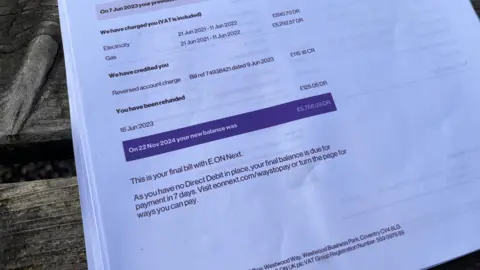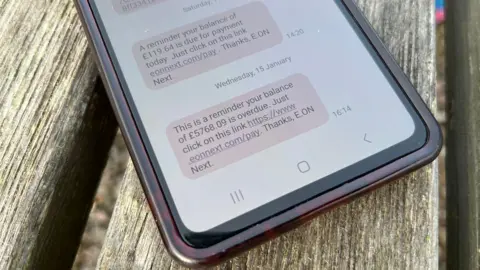‘My £5,700 energy bill was cancelled as it was too old’
 BBC
BBCHayley Jarvis was shocked when she received a £5,768.09 bill in early January for energy from two and a half years ago.
“It was a vast amount of money that would have taken me an incredibly long time to pay back.”
It is a practice known as “back billing”, but sending a bill for energy that was used more than 12 months ago was outlawed by regulator Ofgem in 2018.
But Radio 4’s Money Box has learned that 3,308 people complained to the energy ombudsman about receiving these so-called “back bills” in the 12 months to September 2024.
The actual number of people complaining about back billing is likely to be much higher because only cases that cannot be resolved by suppliers in the first instance get as far as the ombudsman.
Citizens Advice received 47,000 complaints about billing in general in 2023, rising to nearly 60,000 in 2024.
In Hayley’s case her back bill covered a period between June 2021 and June 2022.
“I’m not going to say I wasn’t worried, when I was. Even though I knew I would fight it,” she says.
“I just don’t think it’s right these rules and regulations are there to protect the consumer and it just seems the energy company aren’t following their own principles.”
What is back billing?
- Back billing is when an energy supplier issues customers with a new bill for energy used more than 12 months ago.
- It is against Ofgem regulations and was banned in 2018.
- You do not have to pay any money sent on a new bill for energy used more than 12 months ago.
- Citizens Advice suggests you write to or email the supplier to explain and has a copy of an example letter people can use as a template.

Matt Lynch told Money Box about a very similar situation.
He received a bill out of the blue in November for £1,665 and was told by the company they would take it straight from his account, by direct debit, just five days before Christmas.
“It was three and a half years after I’d moved out of my flat.
“How do you find £1,600 with very little notice? They were going to take the money without even telling me. It was an email I happened to find in my junk mail.”
It took both Matt and Hayley days of multiple calls and emails of complaint before they got their bills rescinded.
But both of those bills should never have been sent in the first place under Ofgem’s back billing rules.
“It’s vital that Ofgem intervenes to ensure these firms are doing what they’re meant to be,” says Alex Belsham-Harris from Citizens Advice.
“These bills shouldn’t be sent out in the first place. Once someone does identify this as an issue for them, if they get in touch with their suppliers then that should be the end of it.”

Regulator Ofgem told Money Box customers shouldn’t have to spend hours rectifying incorrect bills and that it is a supplier’s responsibility to handle complaints effectively, adding that it was committed to reviewing the rules around billing.
Energy UK, which speaks for the industry, says suppliers have a duty of care to customers and are continuously working to improve practices.
The company that sent the back bills to both Hayley and Matt was E.On Next, which is part of the E.On group.
E.On told the BBC it sends out tens of millions of bills each year and that it has systems in place to stop back bills from being sent out.
But in Hayley’s case, it said human error had led to a back bill being sent out, adding it has apologised and is now reviewing its back billing processes to provide the best customer service.
As for Hayley her main concern is for people who might get these bills and not be willing or able to fight them.
“I just think it’s actually quite sad because I’m in a position to fight it but not everybody would be.
“You could have elderly, or vulnerable or isolated people who would see this [the bill] and think, ‘Oh no, I need to pay this.’ There’s nobody there to tell them, ‘Actually, you don’t owe this money, over 12 months have passed.”







